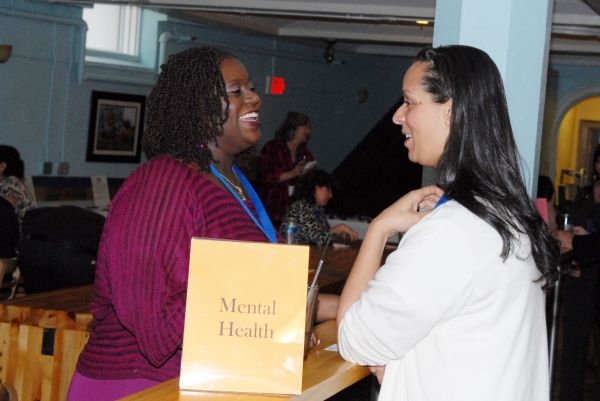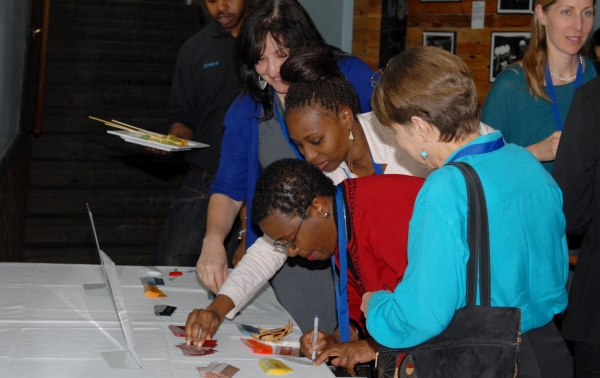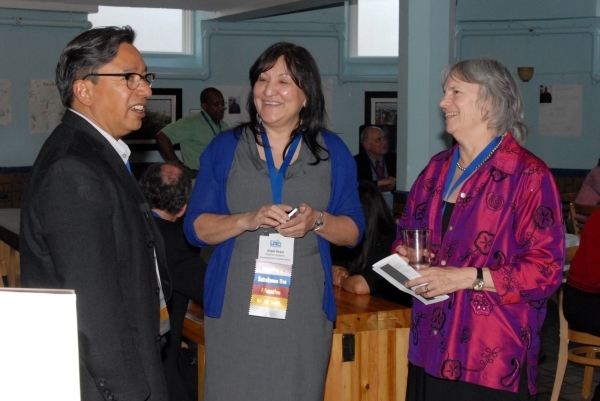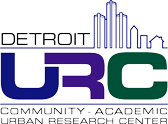Networking Event Brings Detroit Community-Based Organizations, Health Service Agencies and Academic Researchers Together to Discuss Health
 On Monday, May 6th, the Detroit URC hosted the Detroit Networking Social: A Community Academic Research Gathering at COLORS Restaurant in Detroit. The event brought together representatives from community-based organizations, health services agencies and multiple academic institutions, in an effort to create new linkages among those interested in engaging in collaborative research in Detroit. More than 50 individuals participated in the event.
On Monday, May 6th, the Detroit URC hosted the Detroit Networking Social: A Community Academic Research Gathering at COLORS Restaurant in Detroit. The event brought together representatives from community-based organizations, health services agencies and multiple academic institutions, in an effort to create new linkages among those interested in engaging in collaborative research in Detroit. More than 50 individuals participated in the event.
As attendees entered the event they chose from a wide array of colorful ribbons to attach to their nametags. Each ribbon was printed with a health-related topic, for example, mental health, education, physical activity, health literacy, diabetes, food access and more. Guest picked ribbons based on their research and programmatic interests, allowing them to easily identify others with similar interests.
 Detroit URC Director, Barbara Israel, a faculty member at the University of Michigan School of Public Health, shared opening remarks along with Guy O. Williams, Detroit URC Board member and CEO of Detroiters Working for Environmental Justice. Marvin Parnes, Associate Vice President for Research and Executive Director of Research Administration at the University of Michigan Office of Vice President for Research, also addressed the group and expressed the University’s strong support of the collaborative work of Detroit URC partners.
Detroit URC Director, Barbara Israel, a faculty member at the University of Michigan School of Public Health, shared opening remarks along with Guy O. Williams, Detroit URC Board member and CEO of Detroiters Working for Environmental Justice. Marvin Parnes, Associate Vice President for Research and Executive Director of Research Administration at the University of Michigan Office of Vice President for Research, also addressed the group and expressed the University’s strong support of the collaborative work of Detroit URC partners.
Midway through the event, Lidia Reyes-Flores, Detroit URC Board member and Executive Director of Latino Family Services, led an activity - in a style resembling “speed dating” - where attendees were encouraged to meet at tables based on their research and programmatic interests, discuss for 15 minutes and then switch to a new table for a second round of conversations. The event left guests energized by conversations about health-related research in Detroit, and ready to take next steps toward strengthening new collaborative relationships.
 The Detroit URC’s current effort to connect individuals and organizations interested in conducting and disseminating collaborative research in the city of Detroit is funded by a grant from the National Institute on Minority Health and Health Disparities and the University of Michigan. The Detroit URC also hosts a virtual Community-Academic Research Netwok (CAR-Network) on their website; this gathering was an opportunity to bring the CAR-Network to life and invite members to connect in person. Ultimately the Detroit URC strives to facilitate new collaborative research partnerships aimed at improving health and promoting health equity in the City of Detroit.
The Detroit URC’s current effort to connect individuals and organizations interested in conducting and disseminating collaborative research in the city of Detroit is funded by a grant from the National Institute on Minority Health and Health Disparities and the University of Michigan. The Detroit URC also hosts a virtual Community-Academic Research Netwok (CAR-Network) on their website; this gathering was an opportunity to bring the CAR-Network to life and invite members to connect in person. Ultimately the Detroit URC strives to facilitate new collaborative research partnerships aimed at improving health and promoting health equity in the City of Detroit.
To view pictures of the event visit: http://www.flickr.com/photos/detroiturc



